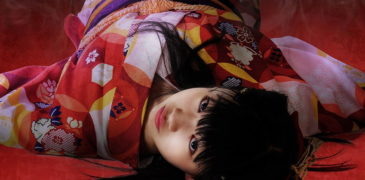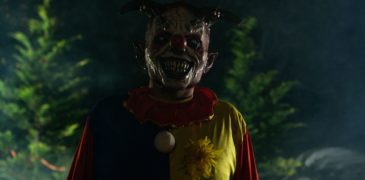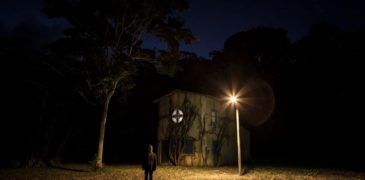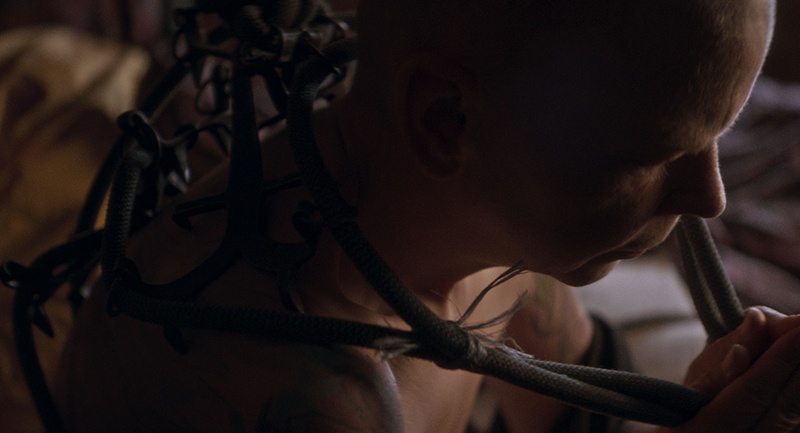
“Every day we stray further from God’s light” may be a ‘meme-able’ saying, but it is one that is none-the-less true when we look at a mix of contempt and disinterest in institutionalized belief that is more prominent than ever. Yet, the interest in exploring faith through cinema seems ever present as religious horror is still an eminent subgenre – evident from Fantastic Fest screening other religious themed horrors such as Agnes, Exorcism of God and Eyes of Fire. However, Peter Brunner’s Luzifer proves to be a unique beast, a dark mediation on religious fervor, isolation and mistreatment of nature.
Having isolated herself from the rest of the world and found god, an elderly woman looks after her mentally impaired son and a small farm with livestock and an aviary. An idyllic existence for the two, and a way to escape the sins of the past, the two concoct their own way of practicing their beliefs, with a heavy emphasis on the concept of fighting against the devil. Tragically, the desires of corporate interests to turn the mountain into a ski resort leads to targeted harassment of the mother and son, bringing the devil right to their doorsteps.
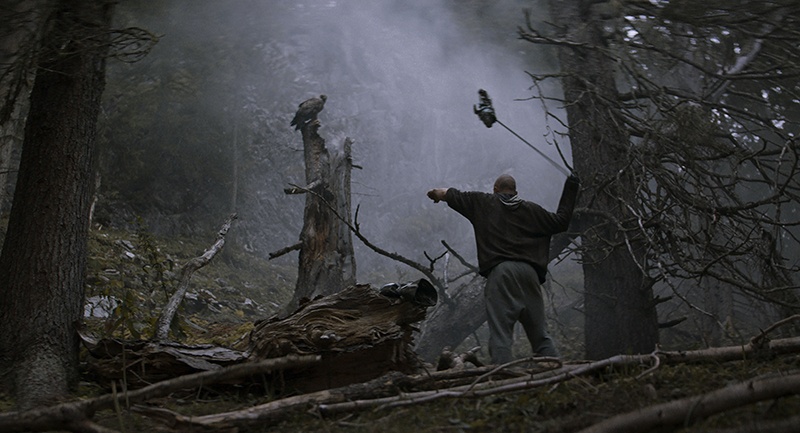
Presented with visual beauty, the mountainside that sets the backdrop for the tale of isolation is gorgeously explored in Brunner’s cinematography. Long contemplative shots capture the simplistic, yet ritualistic, life of the mother and son – their only focus husbandry with breaks for praise. In addition, the score from the maestro of crafting audio soundscapes, Tim Hecker, provides a wonderfully layered and hypnotic score. Consequently, the aesthetic is one of serenity and deep contemplation, even in the face of sensational, shocking imagery.
Practicing their own brand of worship, the relationship between mother and son is one of a lifetime of familiarity in a remote location, one that has torn down the barriers of what is considered socially acceptable in modern context. Here, self-harm to reach closer into the divine is an acceptable form of repentance, yet the most unsettling attributes has to be the unabashed approach towards the human form. The first instance of this comes from the pair dancing and the mother dancing topless in front of her son, but this theme carries out throughout the film with actor Susanne Jensen often exposing all for the camera. However, there is a distinction between being sexual promiscuous, as the act is frowned upon by the motherly figure, and just general openness due to familiarity. Essentially, it is definitively shocking, but within the context of the film, it is perfectly acceptable and captivating from an outsider’s perspective.
The relationship, though foreign, becomes normalized (almost pure) which makes the encroaching threat of the outside world feel like a divine injustice. As the family begins to be harassed by drones and planes in a targeted campaign, empathy for the family’s plight builds despite their odd existence. Interstingly, their love for animals being, which is perhaps their most admirable trait, further cements sympathy for their plight once these animals are harassed. Ultimately, the profound beauty of Luzifer comes from Brunner’s ability to make fringe tragic figures – there is certainly something beautiful about their self-confinement and love of nature.
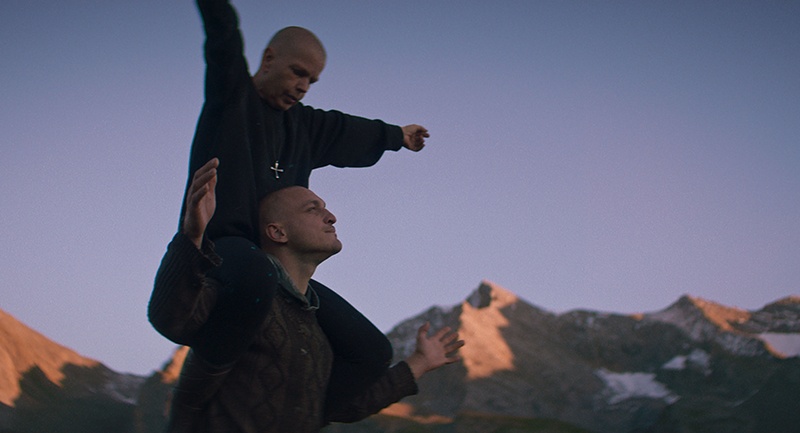
There is a degree of escalation, which is harrowing despite being somewhat predictable. Regardless, it is better to avoid spoilers all together, the film is a unique experience best left for viewers to discover and make their own decisions about the conclusion. However, it should be prefaced that the elements of what makes this horror is tied to human interaction and tragedy.
While the direction and vision of Brunner makes the production a complete success, Susanne Jensen and Franz Rogowski give career defining performances as mother and son. In particular, Rogowski navigates the tricky territory of portraying someone with a severe learning disability, let alone a simple-minded individual managing the complexities of sexual guilt and religious fear. Overall, it is a remarkable performance to witness: the two play off of each other and fully commit to the life of these outsiders.
Deeply engrossing and tragically beautiful, Luzifer is a powerful piece of cinema that begs for a wider audience. Sadly, with the current state of A24-esque productions being considered the peak of arthouse cinema among the masses, productions like this seem more likely to get lost in the hype of other films making the rounds at festival season. Make no mistake, Luzifer is a beautifully realized experience that deserves similar accolades from the ‘A24 vibes’ crowd – give this one a shot.

We Watched Luzifer as Part Of Fantastic Fest 2021

More Festival Coverage
Fans of serialized tokusatsu shows or classic anime OVAs from the 80s and 90s will find themselves right at home checking out this entry at the 2021 Japan-Filmfest Hamburg (JFFH)…. Anyone who’s been in a car accident understands disorientation; the lack of clarity of what just happened, the realization that time does indeed slow down, it’s not some old wife’s… Content Warning: This film contains depictions of ne***philia. Bad Candy takes place in the town of New Salem during Halloween, where two radio DJ’s invite callers to share local myths…. Leo Falcão’s feature film debut Subject (Sujeito Oculto) is a rare genre offering that transcends its format and offers a meditative study of the power of storytelling and life among mythical… Traumatised from witnessing the horrific death of her parents, Sara attempts to take her own life. Waking up in the aftermath of this, she cannot remember anything and does her… At a dilapidated farmhouse that is slowly decaying Josiah (Robert Patrick), the aging patriarch of the Graham family ekes out a defeated existence boozing his way through his remaining life…Yokai Girl Kirin (2020) Film Review – A Tokusatsu-sized Taste of Yokai Action
On the 3rd Day Film Review – Fantasia Festival 2021
Bad Candy (2021) Film Review- A Frightfest Halloween Anthology
Subject (2022) Movie Review – To Exist Is A Personal Verb
The Free Fall (2021) Film Review – Dreams, Gaslighting, or Something Sinister?
What Josiah Saw (2021) Film Review – The Legacy of Trauma
